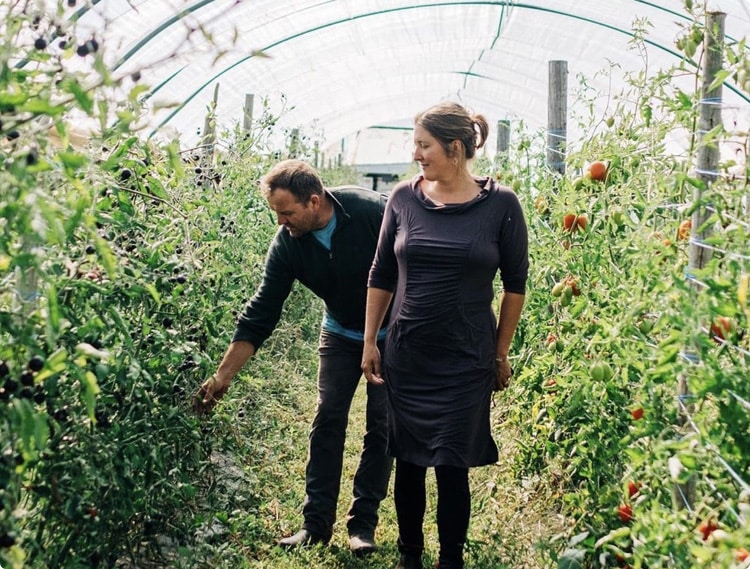
Working together for a sustainable future for all
Organic Nova Scotia promotes Nova Scotia’s Certified Organic producers and processors. We provide support, mentorship and resources to those with and those transitioning to organic certification.
ONS fosters growth within the organic sector by connecting with our communities, our provincial government, and the agricultural community about the valuable work and leadership that organic business owners are doing and have been doing for decades here in Nova Scotia.
What is Organic Farming?
Organic Farming is a holistic system that puts sustainability first – it’s carefully designed to promote the productivity and health of diverse communities within the agricultural ecosystem. This includes soil organisms, plants, livestock and people. The main goal of organic agriculture is to develop systems that function in harmony with the environment.
It is a type of agricultural production that is about so much more than simply choosing not to use pesticides, fertilizers, genetically modified organisms (GMOs) and antibiotics that actively alter crops.
We value
ecology, sustainability, economic health, ethical business practices and fairness above all else.
We work
to create a supportive community of consumers, growers, processors, and civil society members who work together to increase the volume of organic production, level of organic knowledge and a genuine appreciation for organic products.
What is Organic Processing?
Organic processing involves the act of organic agricultural products being combined, refined or otherwise changed to create another organic product while maintaining the integrity of the organic agricultural practices used to grow the raw ingredients.
An emphasis is placed on minimal processing, avoiding artificial ingredients, synthetic preservatives or persistent or harsh chemical cleaners, maximizing the number of certified organic raw ingredients in composite products, and avoiding processes like irradiation, protein extraction with artificial solvents, or any process that uses GMOs or derivatives of GMOs.
You can learn more about the benefits and methods involved in organic farming and processing through the Atlantic Canadian Organic Regional Network (ACORN).
- Growing
Smaller carbon footprint
Organic production accomplishes more with less environmental impact; organic farming relies on climate friendly fertility and renewable energy resources·
Doing good feels good
This method of farming is proven profitable, in tune with nature, and personally fulfilling.
High quality, fertile soil
Healthy soil life is essential to organic production systems. Organic farms feed the soil with materials such as compost and cover crops that maintain organic matter and biological activity while reducing soil erosion. Organic systems do not use synthetic fertilizers which are produced with high energy demands from fossil fuels.
Promotes biodiversity
With more biodiversity, the farm is stronger and more balanced. A robust mixture of plants and microorganisms further promotes soil health. Without pesticides or herbicides, an organic farm is a source of biodiversity for the community. Pest control focusing on prevention and biological controls is within the parameters of organic certification.
A sustainable future
When you choose to pursue organic farming, you’re choosing to support the health of the environment, the economy and the future – for you and your community.
- Processing
Minimal processing
Less processing preserves the nutritional value of the ingredients produced from organic agricultural practices.
Avoiding artificial, synthetic, or harsh compounds
For example, artificial colours or flavours, synthetic preservatives, and chlorine-based cleaners are not permitted.
Avoiding certain processes
Processes like irradiation, protein extraction with artificial solvents, or any process that uses GMOs or derivatives of GMOs is not permitted in organic processing.
Maintaining the integrity of organic agriculture
Processors are required to maximize the number of organic ingredients, maintain full traceability of these ingredients, and document handling, transportation, storage, processing and cleaning throughout the process to ensure no contamination with non-organic ingredients happens during the process.
- Buying
At the supermarket, we can often feel overwhelmed by the number of choices on the shelves. When you choose locally produced food that is grown organically, you’re choosing to support our farmers, our local economy, and the future of environmentally friendly farming in Nova Scotia. That’s why buying local and organic is the best choice. High quality, nutritious, organic food only exists as an option to purchase at farm gate, your local farm stand, farmers’ market, specialty store or on your supermarket shelves because people like you buy it and bring it home.

Are you an organic producer?
Are you working towards becoming an organic producer?
Organic Nova Scotia offers participation in a dynamic organization of producers, processors and friends committed to promoting environmentally nurturing agricultural practices and strengthening rural communities.
Find out how you can learn more, take part and become a member.

